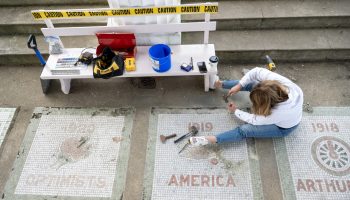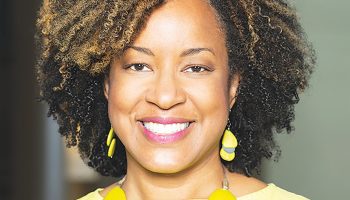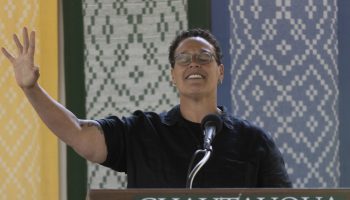Ideological gaps are growing, and political polarization is shaping the culture of the United States in the 21st century.
Associate professor of history at Arizona State University Catherine O’Donnell believes that studying a woman who lived 200 years ago can offer instruction on how to reconcile these growing divides.
At 12:30 p.m. Monday in the Hall of Philosophy, O’Donnell will be giving the second installment of the Lincoln Applied Ethics Series. She will also give a three-day master class this week, 3:30 to 5 p.m. Tuesday to Thursday, through Special Studies. In her lecture, she will discuss Elizabeth Seton, the first native-born American citizen to be sainted in the Catholic church.
“I thought that she would be an interesting case study of a crisis of faith,” O’Donnell said.
Seton was born in 1774 and died in 1821. She grew up in a largely nonreligious family and explored Evangelical Christianity and Episcopalianism before converting to Catholicism following the bankruptcy and eventual death of her husband.
“She was an intellectual inquirer her whole life,” O’Donnell said. “She loved discussions and she also changed her views across her life about whether she should convince people to believe exactly as she did.”
O’Donnell has just finished writing a biography on Seton that will be published sometime next year. She began writing the book eight years ago and is aware of how the political and cultural climate of America has changed since she first began.
“It was a very different political (and cultural) moment (when I started),” O’Donnell said. “I think it felt more as if people would have less trouble communicating across divides.”
As she finished the biography, O’Donnell said that she was cognizant of how central the question of “how do you reconcile single-minded belief in a pluralist environment?” was in Seton’s life.
“At a political level, I do think we’re kind of at a point where it’s become very difficult for people to discuss conflicting views with each other,” O’Donnell said. “Religion is a great example of how that can be difficult and how it’s catastrophic when we cannot figure a way to do it.”
Seton went through various phases in her life trying to find the best solution to this problem. Initially ambivalent toward religion, Seton began actively and aggressively trying to convert people to Catholicism before finally settling on a more passive “live your best life and others will follow” approach, O’Donnell said.
“She really thought a lot about how you should reconcile very strong belief with the fact that other people have different beliefs,” O’Donnell said.
A mother of five and widowed at the age of 30, Seton struggled to balance her personal life with the work she did establishing a community of nuns — now known as the American Daughters of Charity.
“It is really evident in her life that her single-minded belief was inspirational,” O’Donnell said. “On the other hand, it caused all kinds of pain to people around her, and to her. I do think that strong religious views such as she possessed inspire the best and the worst behavior that people are capable of.”
O’Donnell believes the 200-year gap between Seton and today’s society enables one to look more calmly and clearly at the problem of how to best reconcile different beliefs.
“Late in her life she had this view that she did know the best way to worship God … but she also believed she had no business trying to convince others to adopt her way,” she said. “She decided that all she could do was to live in a way that would suggest to others that her way was valid — to be compassionate, to be pious (and) to be gentle … and hope that others would be attracted to that and then would on their own want to investigate her views.”
O’Donnell believes that learning from Seton can help guide the way to how to reconcile the growing divides across the United States.
“I find that instructive, that passive form of evangelizing — whether it’s political or spiritual or social,” she said. “I think that would be of some use to … our current moment.”




